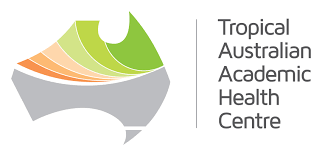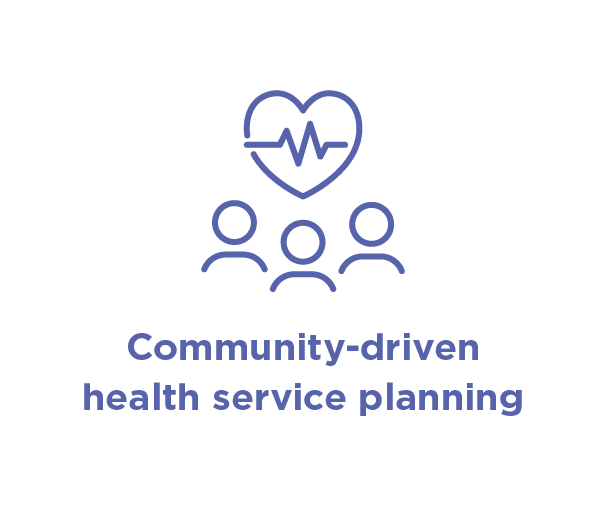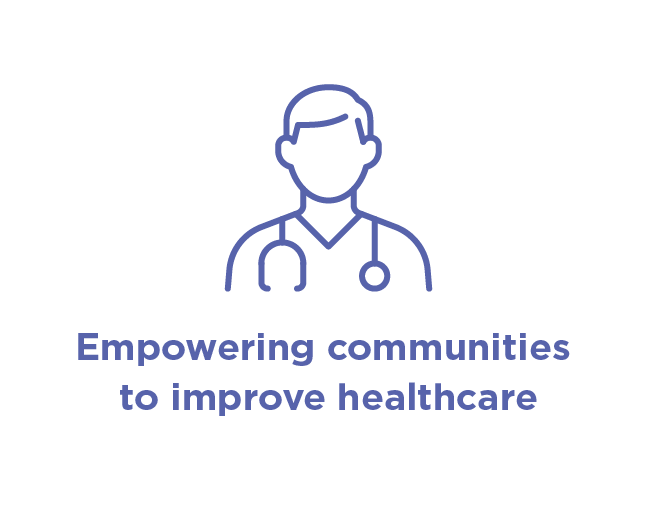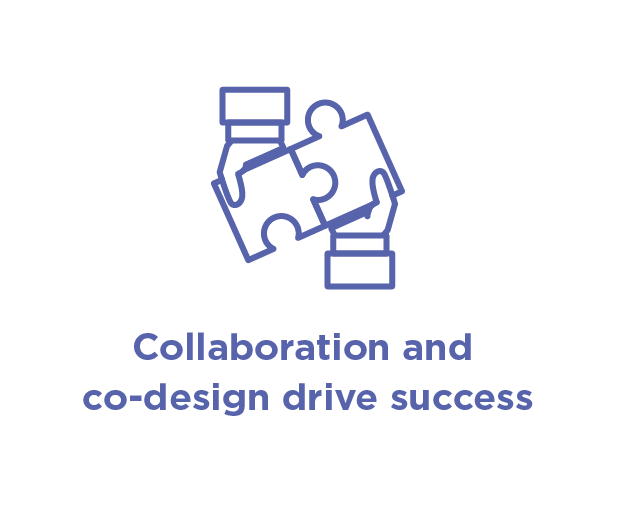The Tropical Australian Academic Health Centre is an NHMRC-accredited Research Translation Centre. We collaborate to deliver research-informed healthcare and training. The below case studies highlight our work in translating research into better health outcomes and building capability across the system.
Case studies on this page:

Case studies from all Research Translation Centres are available from Impact and outcomes.
Developing, re-designing or adopting platforms, systems or workforce initiatives: Using place-based health planning in Hughenden
Challenge
'Brian' is a fourth-generation cattle grazier on a property 15 minutes out of the remote north-west Queensland town of Hughenden. Like many of the town’s residents, 58-year-old Brian’s health care needs are increasing as he ages.
Following a heart valve replacement in 2023, Brian’s medication and blood pressure need regular monitoring, but his cardiac specialist is a 6-hour drive away in Townsville and there’s no-one to look after the farm in his absence.
The Integrating Health Care Planning for Health and Prosperity in North Queensland (IHCP-NQ) project addressed issues of ageing population, limited work opportunities, and poorly coordinated health services, leading to inefficiencies and sub-optimal health and economic outcomes.
Community co-design work identified Hughenden’s key health service issues:
- at project commencement there was no permanent general practitioner (GP)
- visiting services were not well co-ordinated
- residents had limited knowledge of those services
- health resources were further strained by the influx of ‘grey nomads’ over winter.
Approach
The James Cook University team engaged 49 local stakeholders to co-design health care provisions in Hughenden.
Community groups, leaders, and local and regional service providers were engaged in collaborative co-design techniques via interviews and workshops. Co-design revealed key health concerns and identified strengths and gaps in existing service delivery.
Service mapping identified local and visiting providers, services, resources, and skills. Actions and solutions were discussed and prioritised.
Significance
The project developed a community-specific, actionable, health plan and broader guidelines for participatory place-based (PPB) health service planning to use across North Queensland. It delivered a Health and Community Services Directory enabling locals like Brian to engage with visiting specialists and allied health professionals. A group of Community Champions were established to link locals to health services.
The project demonstrated the potential for PPB planning to drive locally relevant solutions and sustainable improvements, and advanced local resident and service provider knowledge of PPB planning – empowering them to improve health systems and design future service delivery.
Collaboration and co-design were intrinsic to success; stakeholders and community were involved in each stage of planning and decision making.



Value-add of centre
The Tropical Australian Academic Health Centre (TAAHC) provided direct writing support for the funding application, facilitated connections to healthcare providers in communities, contributed direct funding ($330,000) and provided project development and administrative support throughout the project period.
A local community group became the project reference group, enhancing researchers’ understanding of context and linking researchers to the community. The Project Support Officer – a local resident – led the implementation of actions.
TAAHC works alongside the community leaders in this project for community and consumer involvement in other TAAHC-led projects.
Reach
The project demonstrated the capability of communities to work together to solve local problems. It empowered individuals and community groups to use research data to successfully lobby for 3 GPs and improved health facilities in Hughenden.
PPB planning was also delivered in the remote North Queensland communities of Kowanyama and Clermont, and community-specific plans developed for these locations.
Broader PPB guidelines (to be published as a free e-book) will assist other rural and remote communities to assess and improve their health systems using co-design.
The Townsville Hospital and Health Board facilitated a visit by their Chair, Tony Mooney, to meet with project partners to learn more about the initiative, indicating wider engagement with this approach is likely.
Next steps
Principles and practices of PPB will be published as an e-book.
To support the scalability of PPB approaches across northern Australia, local data quality must be improved, and mechanisms to translate learnings into existing health planning be developed.
Providing better care: First Nations Peoples: Cape York Kidney Care
Challenge
'Velma' is a 52-year-old Kokoberra and Warrangku woman living in Kowanyama with Chronic Kidney Disease (CKD) and Type 2 diabetes. In addition to thrice-weekly dialysis, her treatment required appointments with Cairns specialists; a 13 hour drive or $800 return flight away.
These visits isolated Velma from her family responsibilities, her culture, and country. The specialists often lack the cultural and linguistic capacity to enable Velma to optimise her disease management. Careful planning is required to ensure dialysis is maintained during transit, the trips are costly and exhausting.
Through seed funding, the Tropical Australian Academic Health Centre (TAACH) supported the development of the Cape York Kidney Care (CYKC) service to address the management challenges of CKD in the Cape York communities of Kowanyama, Weipa, Mapoon, Aurukun, Pormpuraaw, and Napranum for people like Velma.
Compared with the national average, First Nations Australians are 15 times more likely to develop CKD.
The comorbidities of heart disease, Type 2 diabetes and hypertension that frequently accompany CKD, complicate management.
Low socioeconomic status, poor nutrition, genomics, remoteness from specialist health care, low engagement with Telehealth and a dearth of culturally appropriate care, contribute to the burden of CKD in these communities where life expectancy is 20 years below the Queensland average.
Approach
Torres and Cape Hospital and Health Services clinician Dr Andrea Miller and her James Cook University team conducted community and stakeholder consultation and audits to identify the problem and inform service development.
Initial service delivery funding was provided by Queensland Health and the new service commenced in 2019 as a multidisciplinary service integrating primary and tertiary care in Cape York.
TAAHC Seed Grant funding of $49,502 enabled a formal, comprehensive evaluation of the service which allowed for immediate translation of research findings into practice and ensured the service adapted to client and community need.
CYKC is consistent with best practice and the new model of care prioritises culturally sensitive in-community healthcare, enables First Nations clients to maintain connections to country, family, and culture, and reduces travel to specialists. Expertise exchange between community, primary carers, and specialists is encouraged through yarning and clients were empowered to determine their own care pathway.
Significance
Since CYKC program inception, community access to specialist kidney care quadrupled (from 56 in 2017 to 204 in 2019), with a 43% reduction in dialysis starts and fewer emergency dialysis incidents. As a result, clinical costs reduced, validating the sustainability of the CYKC model.
The inclusion of a First Nations health practitioner was critical to ensure cultural safety and to deliver education appropriately. Consistent staffing helped build trust between clients and the service, but depended upon the availability of a small group of staff. The project dataset is Australia’s largest and most comprehensive tracking outcomes for First Nations patients with CKD.
Value-add of centre
Seed funding of less than $50,000 formally evaluated CYKC and enabled research translation. The service now receives recurrent funding and is considered ‘business as usual’. TAAHC continues to support the research team to facilitate translation to a sustainable model of better care and is supporting a grant submission to the Australian Government Department of Health, Disability and Ageing Medical Research Future Fund (MRFF) for more than $1 million to evaluate the new model of care.
Reach
Proximal beneficiaries are the 204 clients, Cape York communities, and community health practitioners whose understanding of kidney disease management was developed through participation.
The project data assists service providers with service development, supporting CKD management for many future patients.
Following further evaluations, distal beneficiaries will include more communities where this model of care is expected to be implemented.
Next steps
Longitudinal health outcomes, program evaluations and comparative data from communities without this model of care will explore service utilisation, client outcomes and community satisfaction.
Project leads have applied for grants to extend the project to other remote Queensland communities, accompanying research will demonstrate the service model’s translatability intrastate and nationally.
The team are also calling for state and federal efforts to improve social determinants of health, including nutrition, housing, and high smoking rates, critical factors in improving health outcomes for Cape York communities.
Meeting the needs of your end-users in your population: building research capability and capacity
Challenge
Many healthcare workers are experts in their work and want to continually improve their clinical practice or service delivery through quality improvement or research. However, they are often less proficient in developing research questions, designing studies, writing grant applications, implementing change, or analysing data. This can create research waste and unsustainable implementation of health initiatives.
The Tropical Australian Academic Health Centre’s (TAAHC) end-users are the staff of our Partner Organisations. Building their research capability and increasing their research capacity are key strategies to improve health outcomes and health service delivery for North Queensland (NQ) communities. TAAHC’s research education and support services facilitate healthcare workers to conduct and translate research more effectively.
Approach
Key stakeholder consultations in 2022 and research training needs surveys conducted in 2023 and 2025, identified key areas of focus from which the TAAHC research education and support services were built (for example, research translation skills; critical appraisal; data analyses; and research question formation and study designs).
Associate Professor Rae Thomas and Emeritus Professor Rhondda Jones AM, lead TAAHC’s research education and support services, these include the Research Education program and the Study Design, Epidemiology and Biostatistics Support Service (SEBSS). The team deliver group-based teaching and individual project support across the spectrum of research and research translation pathway.
To ensure equity of access to TAAHC research training, most training occurs online. An exception is the full-day workshop 'Undertaking and planning research'. This workshop has both in-person and online teaching modes. The online group has dedicated online small group interactions with an online facilitator and interacts with the in-person group in large group sessions.
Significance
In the last year Associate Professor Thomas and Professor Jones collectively delivered over 1,000 hours of education and support service. Group training sessions received a 100% satisfaction rating (satisfied or very satisfied), demonstrating their value to TAAHC partners.
A research planning workshop developed for the Townsville Hospital and Health Service proved so popular it was replicated across NQ and is now offered 6 times a year across the region.
Accolades and success for TAAHC-supported research and research translation demonstrate the importance of our support services. For example:
- A Cairns health service presentation on lung cancer care, where TAAHC conducted data analysis and interpretation, received ‘Best Research Presentation’ at a national conference
- A published paper resulting from a TAAHC funded Clinician Fellowship received ‘Article of the Year’ in a journal
- A clinical nurse educator with little research experience undertook TAAHC training and was supported to lead a successful small grant application in her region
- A research translation project receiving TAAHC mentorship was awarded a Health Service Allied Health Award.
Value-add of centre
Many of our smaller Partner Organisations have limited research training capacity and rarely employ research educators. TAAHC research training fills this gap. With the support of TAAHC’s expert educational services, members are enabled to shape research, set achievable deadlines, deliver quality data analyses to bolster project integrity, and translate findings to improve clinical practice and community health outcomes.
Reach
Beneficial outcomes extend beyond the life of one research project; education empowers members to undertake future projects with increased autonomy and efficacy, ultimately leading to stronger, evidence-based health provision. Posting our webinars on YouTube has almost doubled their reach – with 318 participants registered for the live sessions and another 259 YouTube views.
Next steps
TAAHC have secured additional funding to fill identified gaps in the training pathway. We will create a new research training course and coaching support to assist early career clinician-researchers to design, conduct and publish a study ('Research in the Healthcare Environment').
Additionally, we will provide direct research translation training and individual coaching support to quality improvement teams to conduct research translation ('Redesigning Quality Improvement to Research Translation').
To scale-up research translation, we will create the first TAAHC dedicated funding round to research translation projects.

